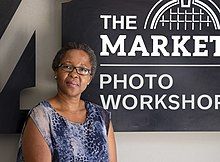Ruth Seopedi Motau
Ruth Seopedi Motau | |
|---|---|
 | |
| Born | 8 March 1968 |
| Occupation | Photographer |
| Years active | 1993–present |
| Notable work | Shebeens (1998) |
Ruth Seopedi Motau (born 1968) is a South African photographer currently living and working in Johannesburg, South Africa. Motau was the first black female photographer who was employed by a South African newspaper as photo editor.[1] Her photography focuses on social documentary influenced by photojournalism and the marginalisation of black people and communities.[2]
Early life
[edit]Motau was born in Zone 2 in Meadowlands, Soweto. She is the last born of 9 children. She went to Tswelelang Primary School, followed by Thutolore Secondary School in Meadowlands, Soweto and Turret College which was set up by the South African Committee for Higher Education Trust (SACHED).[3] Afterwards, she visited George Tabor College (now George Tabor Campus of South West Gauteng TVET College) in Soweto to learn fitting and turning which she did not pursue. Motau found her passion in 1990 when she started studying photography at the Market Photo Workshop in Johannesburg).
Career
[edit]After completing the three year course at Market Photo Workshop, Motau worked as intern at the Mail & Guardian newspaper (1993-1995), where she worked as photographer and picture editor from 1995-2002. She continued to work as picture editor for the South African newspapers The Sowetan (2004-2008) and for City Press (2008-2010). She has completed numerous documentary photo essays and series,[4] among others Shebeens,[5] Sonnyboy's Story,[6] or Women and Municipal Service Delivery.[7] Her work has been exhibited internationally and won numerous awards, its impact and legacy on documentary photography from South Africa is recognised through platforms such as the Photography Legacy Project (initiated by the Goodman Gallery, the David Goldblatt Legacy Trust and Wits Historical Papers).
Methodology
[edit]In a world of image making where photographers go in for purely the images and meeting deadlines, Motau takes a different and more personal approach. She approaches the people depicted in her photographs personally before proceeding to taking the photograph. Instead just snapping away, she’ll make sure that she gets permission from the person that she is photographing. When working on bodies of work she will also spend time with the people who she will be photographing in order to form an intimate bond and to gain the trust of the participants within that certain community that she will be working in.
Something else that is also worth mentioning is the fact that once she’s done with a certain body of work she will always try her best to show the images to the people she photographed so that they are able to engage with the work.
Motau references the former head of state Nelson Mandela as one of the people who also inspired her. She recounts how when she was tasked with photographing him, how he introduced himself even though it was very obvious who he was.
Her work becomes visible through the humility in her attitude towards the people and stories she pursues, which are socio-political stories that effect our communities on a daily basis and that are usually overlooked for hard hitting tabloid stories.
Awards
[edit]- 2001 SABC award for women who made a difference in media[8]
- 1997 Freedom Forum Fellowship, Rhodes University[9]
Selected exhibitions
[edit]2019
Paris Photo international photography art fair, represented by Goodman Gallery, Johannesburg[10]
Yithi Laba. A group exhibition by Lindeka Qampi, Neo Ntsoma, Zanele Muholi, Ruth Motau and Berni Searle at Market Photo Workshop, Johannesburg[11]
2006
Ranjith Kally, Senzeni Marasela and Ruth Motau at Goodman Gallery[12]
2002
South African Family Stories: A Group Portrait. IZIKO South African National Gallery, Cape Town; KIT Tropenmuseum, Amsterdam[13][14]
1995
Black Looks, White Myths exhibition at Johannesburg Biennale, curated by Octavio Zaya, Danielle Tilkin and Tumelo Mosaka[15][16]
Bienal de São Paulo, São Paulo, Brazil
References
[edit]- ^ "Their lenses capture the present ... for the future". Sowetanlive. Retrieved 19 July 2019.
- ^ "Selection of image from photographic exhibition, by Ruth Motau, 'Women and municipal service delivery'". Agenda. 16 (46): 98–99. 1 January 2000. doi:10.2307/4066287. ISSN 1013-0950. JSTOR 4066287.
- ^ Nonyongo, Evelyn; Ngengebule, Thandiwe (June 1993). "The SACHED Distance Education Students' Support Programme". Open Learning: The Journal of Open, Distance and E-Learning. 8 (2): 40–45. doi:10.1080/0268051930080206. ISSN 0268-0513.
- ^ "Ruth Motau Projects – The Photography Legacy Project (PLP)". Retrieved 24 October 2019.
- ^ Sadiki, Leon (17 August 2019). "Photo Essay: Motau's moments in time". CityPress. Retrieved 24 October 2019.
- ^ Motau, Ruth Seopedi (1 September 2004). "Sonnyboy's story : challenges". Rhodes Journalism Review. 2004 (24): 48–49.
- ^ "Selection of image from photographic exhibition, by Ruth Motau, 'Women and municipal service delivery'". Agenda. 16 (46): 98–99. 1 January 2000. doi:10.2307/4066287. ISSN 1013-0950. JSTOR 4066287.
- ^ Staff Reporter (6 August 2010). "Prizes galore". The M&G Online. Retrieved 19 July 2019.
- ^ Staff Reporter (23 December 1997). "Loeries and kudos at M&G". The M&G Online. Retrieved 19 July 2019.
- ^ "GOODMAN - Exposants - PARIS PHOTO". www.parisphoto.com (in French). 4 November 2019. Retrieved 9 November 2019.
- ^ "Yithi Laba exhibition opening". The Market Photo Workshop. 22 February 2019. Retrieved 9 November 2019.
- ^ "A R T T H R O B _ R E V I E W S _ G A U T E N G". artthrob.co.za. Retrieved 10 November 2019.
- ^ Witz, Leslie; Rassool, Ciraj (December 2006). "Family Stories or a Group Portrait? South Africa on Display at the KIT Tropenmuseum, 2002–2003: The Making of an Exhibition". Journal of Southern African Studies. 32 (4): 737–754. doi:10.1080/03057070600995624. ISSN 0305-7070. S2CID 144151063.
- ^ Rassool, Ciraj; Faber, Paul; Witz, Leslie (2007). South African family stories. Reflections on an experiment in exhibition making (Bulletin 378, Tropenmuseum). Amsterdam: KIT Publishers. ISBN 978-906832-4921.
- ^ "The 1st Johannesburg Biennale | South African History Online". www.sahistory.org.za. Retrieved 9 November 2019.
- ^ Johannesburg Biennale (28 February 1995). Ruth Motau Johannesburg Biennial, Black Looks.
